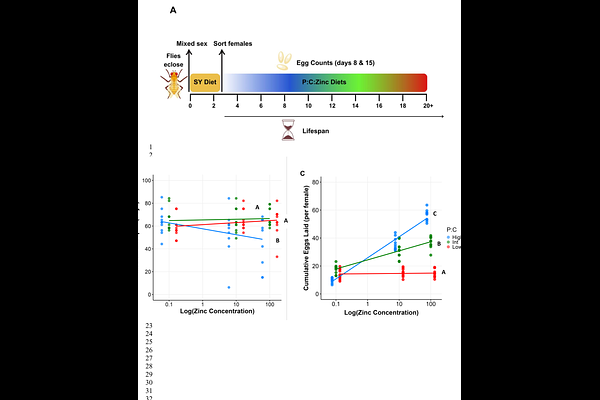Dietary Zn governs protein: carbohydrate regulation of fecundity and lifespan in Drosophila melanogaster

Dietary Zn governs protein: carbohydrate regulation of fecundity and lifespan in Drosophila melanogaster
Sarmah, S.; Burke, R.; Mirth, C.; Piper, M.
AbstractRecent work has shown that dietary zinc (Zn) restriction has a strong effect to limit egg production in female Drosophila, while also producing a variable, but beneficial, effect on lifespan. This combination of phenotypes is interesting because it is consistent with the disposable soma theory of ageing, and phenocopies the well-studied effects of reducing the dietary protein-to-carbohydrate (P:C) ratio. Thus, Zn restriction may be a key precision nutrition intervention to extend lifespan. To investigate this, we decided to assess the interactive effects of dietary Zn and P:C ratios on reproduction and lifespan. We found that the interventions interact, producing equally strong, but not additive, effects to modify female reproduction and lifespan. Specifically, both Zn restriction and lowering the P:C ratio reduced reproduction and benefited lifespan, but only when the other nutrient was maintained at high levels. When either Zn or P:C was at intermediate or low levels, adjusting the other nutritional component varied reproduction, but did so independently of lifespan, which remained fixed at a high level. Disrupting the Zn transporter, white, modified the magnitude of some effects, but not their direction. Thus, the micronutrient Zn modifies life-history outcomes to the same extent as altering the macronutrient (P:C) ratio, indicating its nutritional availability is likely to be a key determinant of fitness for Drosophila.